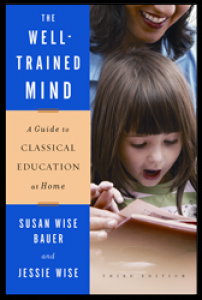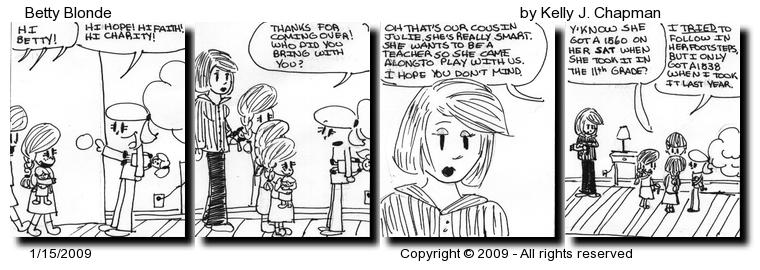 Tom Gilson of the Thinking Christian blog has an article over at Breakpoint titled How Homeschooling and Classical Christian Schooling Could Alter the Leadership of the Future. It captures some ideas I have had about the impact of homeschoolers in the near future–the next 15 to 25 years. His reasons are different from mine. I, like him, believe the Classical Education movement will have a pretty serious impact on our society. Gilson feels that would be quite I hopeful turn of events. My feelings are much more tempered. I think it would probably be a net positive, but wrote about why the way those methods are currently practiced can be problematic in a post (here) that is now seven years old. The following quote from my post captures the flavor of my feelings about Classical Education as I had seen it practiced when I was looking at traditional school settings and trying to decide what would be a good way to educate our own children:
Tom Gilson of the Thinking Christian blog has an article over at Breakpoint titled How Homeschooling and Classical Christian Schooling Could Alter the Leadership of the Future. It captures some ideas I have had about the impact of homeschoolers in the near future–the next 15 to 25 years. His reasons are different from mine. I, like him, believe the Classical Education movement will have a pretty serious impact on our society. Gilson feels that would be quite I hopeful turn of events. My feelings are much more tempered. I think it would probably be a net positive, but wrote about why the way those methods are currently practiced can be problematic in a post (here) that is now seven years old. The following quote from my post captures the flavor of my feelings about Classical Education as I had seen it practiced when I was looking at traditional school settings and trying to decide what would be a good way to educate our own children:
Our problem with “Classical Education” has not been so much the theory behind it, rather it has been the rigidity by which it is often practiced both in homeschool and private school settings. The end product of such systems seemed to be little lawyers. While that may be a fine end for many, we did not want that for our children.
There are some great things about Classical Education . We successfully used some of the methods and materials described by Susan Rice Bauer in her book The Well-Trained Mind, A Guide to Classical Education at Home. We highly recommend that book for anyone considering homeschool. I do not want to get into the nuts and bolts of Classical Education, but we completely buy into to idea that it can be a good way to impart knowledge to children. The use of that knowledge to argue with force is described in a quote from Susan Wise Bauer’s description of Classical Education on the Well-Trained Mind website.
The final phase of a classical education, the “Rhetoric Stage,” builds on the first two [Grammar and Logic]. At this point, the high school student learns to write and speak with force and originality. The student of rhetoric applies the rules of logic learned in middle school to the foundational information learned in the early grades and expresses his conclusions in clear, forceful, elegant language.
I am sure there are ways that “speak[ing] with force” and using “forceful” language can be interpreted to include grace and charity, but that did not seem to be how it was practiced very often in the Classical Education community with whom we came into contact. We tended toward books like Tactics by Greg Koukl which really talks about how to impart truth with grace and How to Win Friends and Influence People by Dale Carnegie which, well, is about how to win friends and influence people. Neither of these books talked about force. Rather they focused on the idea that there are humans involved in rhetorical interactions that can be accommodated in a much more effective way than by just the force of logic.
I wrote about something our buddy Luke‘s dad John Holzmann posted on his blog a few years back that captures my sentiments on the subject. I highly recommend reading the whole post. Here is the excerpt I posted from a speech titled “Homeschooling – Capturing the Vision” given by Kevin Swenson at the CHEC “Men’s Leadership Summit” in 2009:
He says if you dare practice rhetoric; if you dare stand up and give an answer; if you dare to get involved in the activity of the exchange of information and knowledge–he says, whatever you do, make sure you don’t forget to do it in the fear of God, and in humility before man. I’ll tell you, guys, the No. 1 sin that seems to be rampant in our society today, among educated people–and I’m talking about pastors, I’m talking about classical educators, I’m talking about kids that are out there blogging, I’m talking about pseudo-smart people who are trying to argue their point on the blogosphere–I’ll tell you, the No. 1 problem I see is the problem of pride. It’s everywhere. It’s insidious, and it’s ripping apart relationships in churches. It rips apart relationships in this movement.
As a final statement, I think it is appropriate to post a second excerpt from that same speech:
Now, it’s really interesting that Aristotle does an entire book on rhetoric. I bring up Aristotle because he is the grandpa of classical humanist education, so he does a huge book on rhetoric. I taught rhetoric through that book one time, and there’s so much lacking in that book that I don’t teach out if it much, anymore. But one of the things that’s lacking is any reference to fear and reverence and humility, and yet Peter – the apostle Peter – has one tiny little verse on rhetoric – on teaching rhetoric. He says, “Be prepared to give an answer to every man for the faith that’s within you, yet do it with meekness and fear.” [1 Peter 3:15 –JAH] He has one little verse on rhetoric. He doesn’t forget to include two very, very, very vital issues.
Betty Blonde #131 – 01/15/2009

Click here or on the image to see full size strip.

Leave a Reply